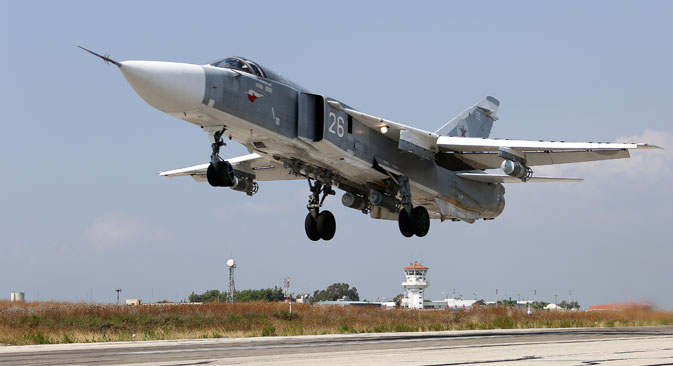
Russia's Sukhoi Su-24 attack aircraft at the Hmeymim airbase.
TASSThe destruction of a Russian aircraft by the Turkish military could trigger the most acute crisis between Moscow and one of the NATO member states since the end of the Cold War, writes Maxim Yusin, a columnist for the business daily Kommersant.
Later this week, after a visit to Moscow by French President Francois Hollande, it must be decided whether the West and Russia will be able to act in Syria as part of a unified coalition.
This scenario hardly suits Ankara, writes Yusin, because it implies that Syrian President Bashar al-Assad will remain in power, at least for a transitional period, while the main goal of Turkish President Recep Tayyip Erdogan is to overthrow him as soon as possible.
In addition, Sunni radicals, against whom the Russian air force's strikes are mainly directed in Syria, are not Ankara's main opponent at all. For Turkey's current authorities, the main opponents are the Kurds and the "Alawite regime" in Damascus.
That is why Turkey will do everything for the Russian operation in Syria to end in failure, for Moscow to fail to agree with Europe and the United States on joint actions.
So now, writes Yusin, Ankara is aggravating the situation as much as possibly by shooting down the plane, even if it is obvious to everyone that Russian aircraft in no way threaten the Turkish military – it is not against them that Russia is fighting.
Erdogan is clearly counting on an emotional, reckless reaction from Moscow: retaliatory actions that will mobilize the rest of NATO in support of Turkey, thwart attempts at rapprochement between Russia and the West, and bury plans to create a single anti-terrorist coalition in Syria.
And Moscow must clearly understand this, says Yusin – and not allow the Turkish scenario to play out.
The news that the Organization of Petroleum Exporting Countries (OPEC) plans to stabilize oil prices caused a speculative, short-term rise in prices on Nov. 23, after which they continued to fall, the centrist daily Nezavisimaya Gazeta reports.
At the beginning of trading, Brent crude fell to $43.58 per barrel. The Bloomberg news agency attributed this local rebound to statements allegedly made by the representatives of Saudi Arabia about their willingness to take measures to stabilize oil prices.
Saudi Arabia is maintaining the strategy of retaining its market share due to price discounts. At the end of the first 10 months of 2015, it overtook Russia to become the largest supplier of oil to China.
Meanwhile in January-September 2015, Russian oil's export volumes rose by almost 10 percent, which means that Russia is increasing oil exports despite low prices.
"The cartel [OPEC] can reduce the competitiveness of Russian raw materials if it continues to offer significant discounts to customers," said Eldar Kasayev, a member of the expert council at the Union of Oil & Gas Producers of Russia.
"In such a scenario, Russia has a very effective defense mechanism – to increase the supply of a different energy carrier – natural gas – to Asian customers. This will be a serious blow to many members of the cartel, since they are actively selling natural gas, along with the oil," he said.
The possibility of the deployment of a Russian military base in Cyprus is being discussed on the island, reports the daily broadsheet Izvestiya. Marius Fotiu, head of the Cyprus Orthodox Human Rights Center, and the movement's activists have appealed to President Nicos Anastasiades with this request.
The Cypriots fear the threat from Islamic State (ISIS). As Fotiu stresses, of all the European Union's countries, Cyprus is the closest to Syria, so its residents are afraid of terrorist attacks. In support of its initiative, the organization has launched a signature-collecting campaign among fellow citizens.
"Until the terrorists are defeated, our country will be in the area of highest risk. Our army, air force and navy need the support of a strong and skillful ally. Russia has repeatedly demonstrated the principles of peacekeeping and the protection of justice and freedom in Europe," the document says.
"I believe that we can collect many signatures – a few thousand," said Fotiu.
"As seen from the discussions that we have held, from postings on the social networks, the majority of the citizens of Cyprus are happy that Russian President Vladimir Putin has decided to fight the terrorists in Syria.
"And people would like Cyprus to be covered by the same protective 'umbrella.' Therefore, I think that people will respond very positively to our initiative. We will continue to collect signatures for a few more weeks to gather as many as possible. "
Izvestiya failed to get a prompt response from the Russian Defense Ministry on the possibility of placing a military base in Cyprus.
Sergei Markov, head of the Institute of Political Studies, is sure that any talks between Nicos Anastasiades and the Russian side are out of the question, since Cyprus wants to join NATO.
"No one simply will allow him to place Russian troops on his territory," said Markov.
"But it is true that the Cypriots love Russia – it once freed the Greeks from the dominion of the Ottomans, and it is Orthodox. I think that in such a way (by appealing to the head of state), the Cypriots are expressing their sympathy for our country.”
All rights reserved by Rossiyskaya Gazeta.
Subscribe
to our newsletter!
Get the week's best stories straight to your inbox